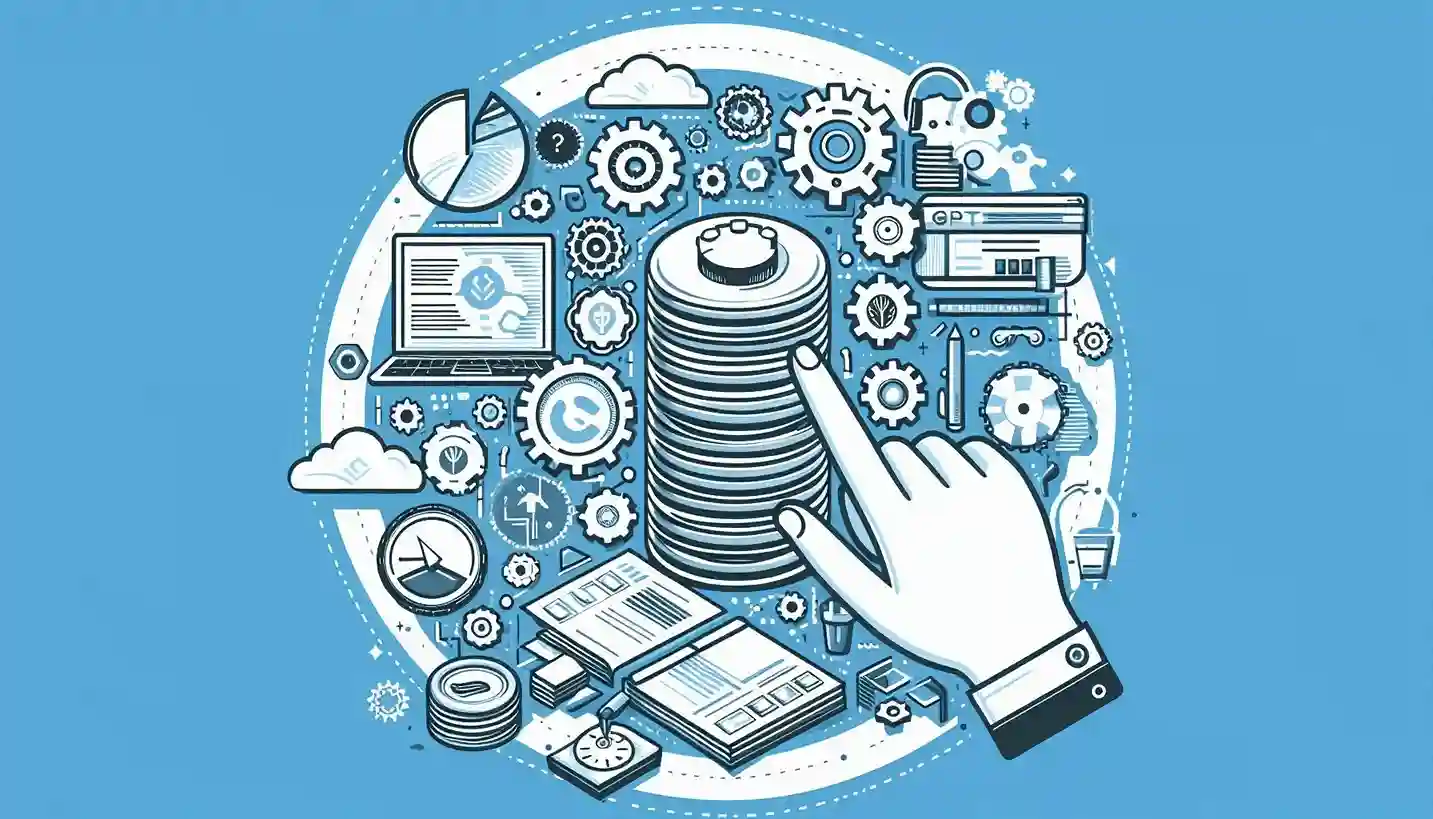Future of Custom Software Development: AI & ML Innovations

“The future is already here – it’s just not very evenly distributed.” – William Gibson. This insightful quote by William Gibson perfectly captures the current state of custom software development. Cutting-edge technologies like Artificial Intelligence (AI) and Machine Learning (ML) are no longer relegated to science fiction; they’re rapidly transforming the way businesses approach software solutions. While some companies are already reaping the benefits of this integration, others are still grappling with understanding its true potential.
This blog post delves into the exciting future of custom software development, where AI and ML are poised to become the cornerstones of innovation. We’ll explore how these technologies are reshaping the development landscape, from automating mundane tasks to creating intelligent and adaptable software.
Custom Software Development, AI Streamlining Processes
Imagine a world where developers have a tireless, intelligent assistant by their side. This is the reality that AI promises. AI-powered tools are streamlining development processes in several ways:
Effortless Code Generation
Repetitive coding tasks like writing boilerplate code or basic functionalities can be automated by AI. This frees up developers to focus on more complex problems and creative aspects of software design. For instance, AI can generate code for common data structures, database interactions, or user interface elements based on pre-defined parameters. This not only saves developers time but also ensures consistency and reduces the risk of errors in these repetitive tasks.
Smarter Debugging and Bug Detection
The debugging process can be a tedious task of manually sifting through lines of code to identify and fix errors. AI can analyze code to identify potential bugs and vulnerabilities much faster than traditional methods. AI can look for patterns in code that often indicate bugs, such as memory leaks, logical errors, or security vulnerabilities within custom software development. This allows developers to pinpoint the root cause of issues quicker, leading to faster development cycles and more robust software.
AI-powered Testing
Creating and executing test cases can be a time-consuming and error-prone process. AI can automate this task by generating comprehensive test suites based on predefined functionalities and user behavior patterns. AI can analyze the software’s code and user interface to identify potential test cases, covering various scenarios and edge cases. This not only reduces the manual effort required for testing but also ensures more thorough and comprehensive testing, leading to higher quality software.
Personalized Coding Assistance
AI can learn a developer’s coding style and preferences. This allows them to suggest code snippets, auto-complete functions, and even identify the most efficient coding practices for specific situations. Imagine an AI assistant that can predict what functions a developer might need based on their current code and suggest relevant libraries or frameworks. This personalized assistance can significantly improve developer productivity and code quality.
The benefits of AI go beyond just streamlining tasks. AI can also act as a powerful collaborator, providing developers with insights and recommendations based on vast datasets and real-time data analysis. For example, AI can analyze user feedback data to identify areas for improvement in the software’s functionality or user interface. This fosters a more data-driven development approach, leading to software that is better tailored to user needs and market demands.
How Machine Learning is Revolutionizing Custom Software Development
Machine Learning (ML) injects a layer of intelligence into software, allowing it to learn and adapt over time. This opens doors to a whole new level of user experience and software functionality:
Predictive Analytics and Personalization
ML algorithms can analyze user behavior, preferences, and past interactions to predict future needs and personalize the software experience. This can be anything from recommending relevant features to anticipating user actions and dynamically adjusting the interface. For instance, an e-commerce platform can use ML to recommend products to users based on their past purchases and browsing history. Imagine a software program that tailors its functionalities and layout based on how a user interacts with it, offering relevant suggestions and streamlining workflows.
Enhanced User Interfaces
ML can analyze user interaction patterns with the software interface to identify areas for improvement. This allows for the creation of intuitive and user-friendly interfaces that adapt to individual user preferences. ML algorithms can track user interactions with various elements on the screen, such as buttons, menus, and search bars. Based on this data, the interface can be dynamically adjusted to prioritize frequently used features or optimize the layout for a specific user’s needs.
Intelligent Chatbots and Virtual Assistants
ML is the backbone of intelligent chatbots and virtual assistants that can provide real-time support and answer user queries in a natural, conversational way. These AI-powered assistants are becoming increasingly sophisticated and can even handle complex tasks. Imagine a customer service chatbot that can not only answer basic questions but also learn from past interactions to provide personalized solutions and recommendations.
Self-Optimizing Software
Imagine software that can continuously monitor its own performance and automatically adjust settings or functionalities to optimize performance. ML algorithms can make this a reality, leading to software that is constantly learning and improving. For instance, an ML-powered resource management system could dynamically allocate resources based on real-time usage patterns, ensuring optimal performance and preventing bottlenecks. This capability of self-optimization allows software to not only adapt to changing user needs but also adjust to its own internal environment, leading to a more efficient and reliable system.
Beyond Efficiency: Creativity and Innovation
While AI and ML excel at automating tasks and optimizing processes, it’s important to remember that human creativity and ingenuity remain irreplaceable in software development. The true potential of this future lies in the synergy between human and machine intelligence.
Focus on Strategic Thinking and Innovation
With AI handling repetitive tasks, developers can dedicate their time to higher-level strategic thinking and innovation. This allows them to explore new functionalities, design creative solutions, and push the boundaries of what software can achieve. Freed from the burden of mundane tasks, developers can focus on the big picture, conceptualizing groundbreaking features and functionalities that leverage the power of AI and ML to create truly transformational software solutions.
Improved Communication and User Understanding
AI can analyze vast amounts of user data to provide developers with a deeper understanding of user needs and pain points. This fosters better communication and collaboration between developers and users, leading to software that is truly user-centric. AI can analyze user feedback, social media conversations, and user behavior patterns to identify underlying needs and frustrations. This comprehensive user data empowers developers to design software that addresses real-world problems and delivers a seamless and intuitive user experience.
Democratization of Development
AI-powered development tools have the potential to lower the barrier to entry for custom software development. This could empower smaller businesses or even individuals to create their own custom solutions without needing a team of highly skilled developers. Imagine AI-powered platforms that guide users through the development process, offering pre-built modules, automated code generation, and intuitive interfaces. This democratization of development could unlock a wave of innovation, allowing new ideas and solutions to emerge from a wider range of creators.
Custom AI Software Development Solution For Enterprises
The Road Ahead for Custom Software Development
The future of custom software development is a symphony of human expertise and machine intelligence. By embracing AI and ML, developers can unlock a new era of innovation, creating software that is not just functional but intelligent, adaptable, and constantly evolving to meet the ever-changing needs of users and businesses.
However, it’s crucial to acknowledge the challenges that lie ahead. Ethical considerations surrounding AI bias and data privacy need to be addressed. Additionally, ensuring a smooth transition and effective upskilling of the developer workforce will be paramount.
Despite these challenges, the future of custom software development is brimming with potential. As AI and ML continue to evolve, we can expect even more groundbreaking applications and functionalities to emerge. This future holds immense promise for businesses seeking to gain a competitive edge and for users who will benefit from software that is tailored to their unique needs and provides an ever-improving experience.









